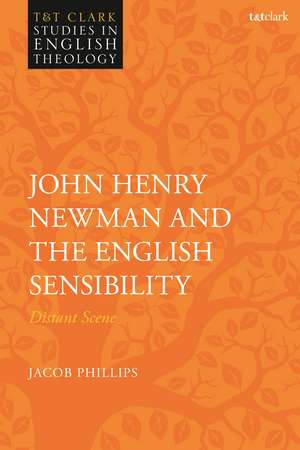John Henry Newman and the English Sensibility: Distant Scene: T&T Clark Studies in English Theology
Autor Dr Jacob Phillipsen Limba Engleză Hardback – 3 mai 2023
Din seria T&T Clark Studies in English Theology
- 14%
 Preț: 508.07 lei
Preț: 508.07 lei - 24%
 Preț: 188.99 lei
Preț: 188.99 lei - 21%
 Preț: 216.99 lei
Preț: 216.99 lei - 30%
 Preț: 509.45 lei
Preț: 509.45 lei - 22%
 Preț: 237.02 lei
Preț: 237.02 lei - 13%
 Preț: 236.09 lei
Preț: 236.09 lei - 13%
 Preț: 222.93 lei
Preț: 222.93 lei - 21%
 Preț: 217.44 lei
Preț: 217.44 lei - 24%
 Preț: 195.91 lei
Preț: 195.91 lei - 23%
 Preț: 190.68 lei
Preț: 190.68 lei - 23%
 Preț: 191.13 lei
Preț: 191.13 lei - 23%
 Preț: 192.64 lei
Preț: 192.64 lei - 22%
 Preț: 510.60 lei
Preț: 510.60 lei - 28%
 Preț: 466.81 lei
Preț: 466.81 lei - 14%
 Preț: 512.69 lei
Preț: 512.69 lei
Preț: 508.32 lei
Preț vechi: 729.97 lei
-30% Nou
Puncte Express: 762
Preț estimativ în valută:
97.28€ • 101.19$ • 80.31£
97.28€ • 101.19$ • 80.31£
Carte tipărită la comandă
Livrare economică 12-26 aprilie
Preluare comenzi: 021 569.72.76
Specificații
ISBN-13: 9780567689016
ISBN-10: 0567689018
Pagini: 152
Dimensiuni: 156 x 234 mm
Greutate: 0.39 kg
Editura: Bloomsbury Publishing
Colecția T&T Clark
Seria T&T Clark Studies in English Theology
Locul publicării:London, United Kingdom
ISBN-10: 0567689018
Pagini: 152
Dimensiuni: 156 x 234 mm
Greutate: 0.39 kg
Editura: Bloomsbury Publishing
Colecția T&T Clark
Seria T&T Clark Studies in English Theology
Locul publicării:London, United Kingdom
Caracteristici
Combines the approaches of Newman's identity as a '19th century man of letters' and his theological ideas and most proximate ecclesial contexts studies, showing how the two dimensions interrelate
Notă biografică
Jacob Phillips is Director of the Theology Institute at St Mary's University, UK.
Cuprins
Chapter 1: John Henry Newman and Englishness Chapter 2: The English Sensibility Chapter 3: Newman's Tractarian Compromise Chapter 4: Newman's Tractarian Reserve Chapter 5: Newman's Tractarian Empiricism Chapter 6: Compromise in the Second Spring Chapter 7: Reserve in the Second Spring Chapter 8: Empiricism in the Second SpringChapter 9:Compromise in the Mature NewmanChapter 10:Reserve in the Mature NewmanChapter 11:Empiricism in the Mature NewmanConclusion: Distant SceneBibliographyIndex
Recenzii
It is a common observation that John Henry Newman was quintessentially English, however Philips demonstrates that in the encounter between Catholicism and Englishness in Newman's theology, there are both coalescences and corrections to English sensibilities and intellectual fashions. German readers of Newman have long been aware of this. This work by Philips offers a comprehensive treatment of the issue. It is written with a high level of English literary elegance that does justice to the genre of Newman studies. It is likely to become a seminal reference work in the field.
Dean Church, Newman's lifelong friend, called attention to the convert's inalienable Englishness, his "chief interests" being "for things English -- English literature, English social life, English politics, English religion." In John Henry Newman and the English Sensibility, Jacob Phillips revisits this characteristic aspect of Newman with fresh, judicious, learned insight.
Dean Church, Newman's lifelong friend, called attention to the convert's inalienable Englishness, his "chief interests" being "for things English -- English literature, English social life, English politics, English religion." In John Henry Newman and the English Sensibility, Jacob Phillips revisits this characteristic aspect of Newman with fresh, judicious, learned insight.
